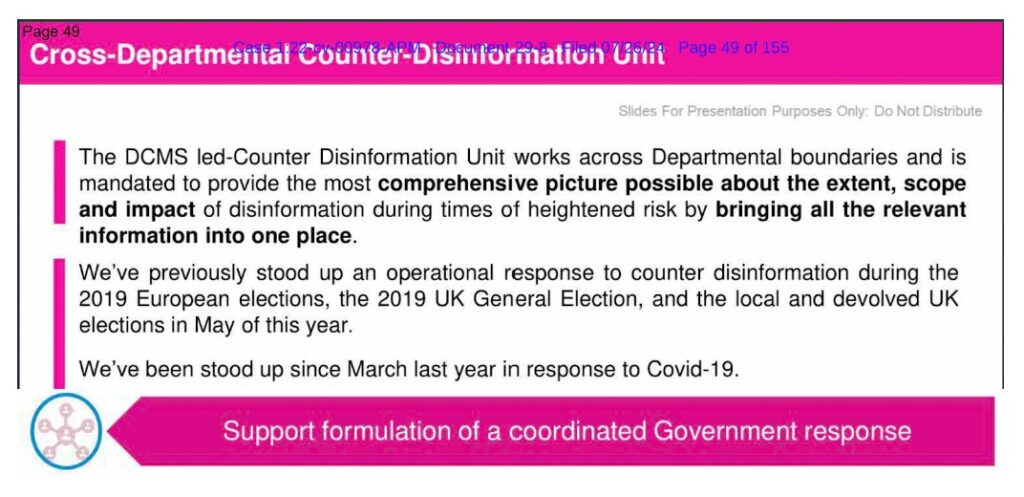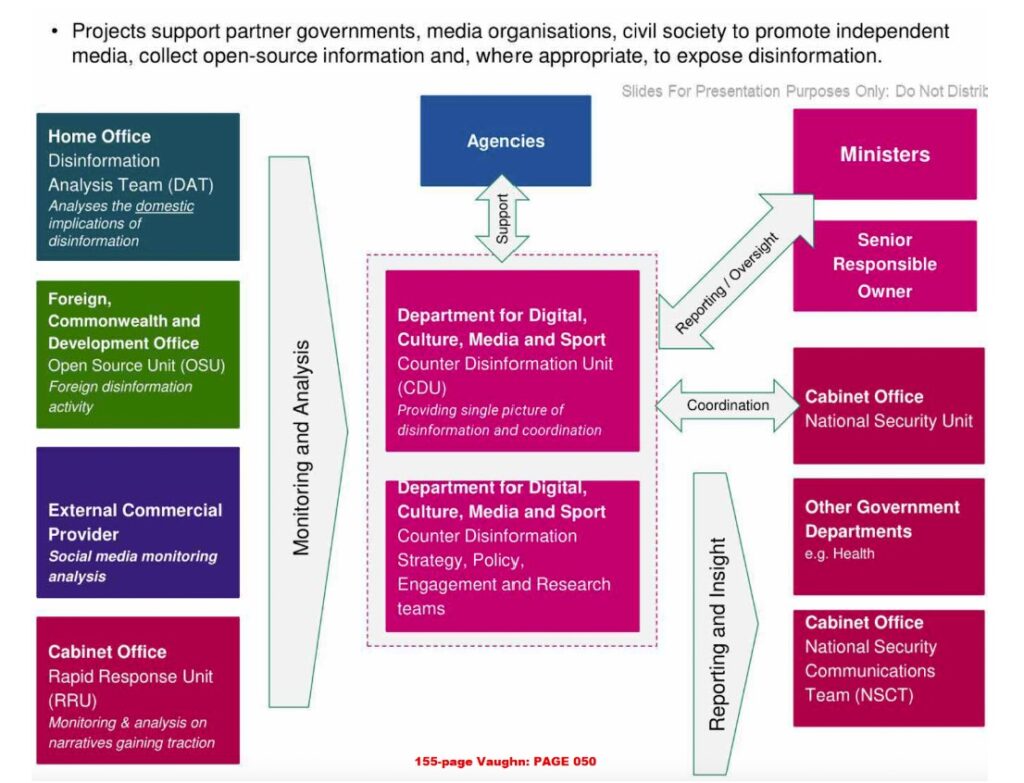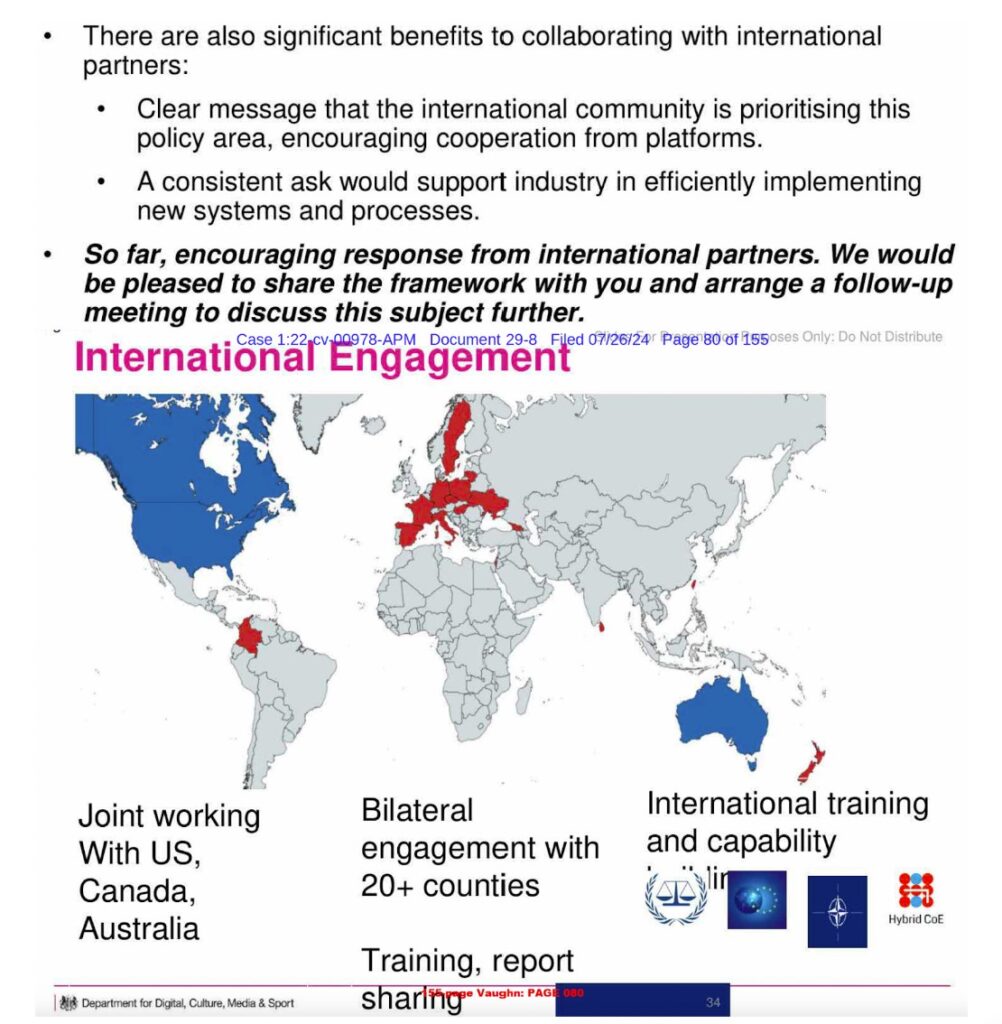A shadowy UK government agency with no statutory footing previously used to monitor lawful but dissenting speech during the Covid lockdowns advised the Biden-Harris administration on working with Big Tech and various multilateral institutions to suppress and censor what it defines as ‘disinformation’.
According to documents obtained by legal organisation America First Legal (AFL), the White House hosted the Counter Disinformation Unit (CDU) – now rebranded as the National Security Online Information Team (NSOIT) and housed in the Department for Culture, Media and Sport (DCMS) – as part of the Biden-Harris National Security Council (NSC) as recently as August 2021.
The meeting was attended by high-level staff from the White House, the NSC, the Office of the Director of National Intelligence (ODNI), the Central Intelligence Agency (CIA), the Federal Bureau of Investigation (FBI), the Departments of State, Treasury, Defence (DOD), Homeland Security (DHS), and Health and Human Services (HHS), the US Agencies for International Development (USAID) and Global Media (USAGM), as well as high-ranking officers in the Army, Navy, and Air Force.
During this meeting, the CDU briefed US officials on effective techniques for censoring ‘disinformation’, including creating a dedicated hub to lead government-wide censorship efforts, passing legislation to enable the government to coerce social media companies, and enlisting the Department of State to partner with foreign allies and multilateral institutions to coordinate the global censorship agenda.
The slide deck used during the presentation avoids providing a definition of ‘disinformation’, and focuses instead on imparting practical techniques for suppressing and censoring whatever forms of speech that government agencies determine as falling under that label.
“The DCMS led-CDU works across Department boundaries and is mandated to provide the most comprehensive picture possible about the extent, scope and impact of disinformation during times of heightened risk by bringing all the relevant information into one place,” one slide explains.
“We’ve previously stood up an operational response to counter disinformation during the 2910 European elections, the 2019 UK General Election, and the local and developed UK elections in May [2021],” it continues, before adding: “We’ve been stood up since March last year in response to Covid-19.”

On a separate slide, a flow diagram explains that analyses of “the domestic implications of disinformation” produced by a Home Office Disinformation Analysis Team (DAT), feed into the CDU’s work as it provides “single picture” reports on “disinformation” trends to government ministers.

Elsewhere, the CDU explains that its attempts to “counter disinformation” are undertaken in collaboration with agencies in the US, Australia, Canada and 20 additional countries and involve various multilateral institutions the G7’s Rapid Response Mechanism and the United Nations Interagency Platform on Culture for Sustainable Development (IPCSD). The logos of the North Atlantic Treaty Organization (NATO), the International Criminal Court (ICC), and the European Centre for Excellence of Countering Threats are visible under the heading: “International training and capability.”

At first glance, “countering disinformation” might seem like a fairly reasonable remit – after all, disinformation is defined in the dictionary as “false information spread in order to deceive people”, and the CDU was first established by the UK government in 2019 as a means to combat what it described as ‘disinformation’.
However, at the CDU the word ‘disinformation’ seems to have been peculiarly malleable.
During the Covid lockdowns, for instance, the unit’s remit was widened to cover the “inadvertent sharing of false information” – i.e., misinformation, not disinformation. As a result, the secretive unit began monitoring social media posts by members of the British public for possible misinformation, and flagging content considered ‘problematic’ to social media companies for censorship.
The previous Conservative administration repeatedly claimed the CDU couldn’t force platforms to remove content, which is true. But what’s also true is that DCMS enjoys a special relationship with several social networks by dint of its “trusted flagger status”, something that inevitably gives it extra weight when flagging content to social media companies.
Last year, the CDU was the subject of controversy following reports that it had monitored and flagged for deletion posts – including from senior Conservative, Labour and Green politicians – that were not misinformation, but merely critical of government policy – that were not ‘misinformation’, but merely critical of government policy.
Was there any limit to who the CDU would subject to scrutiny? Apparently not.
Conservative MP and former Home Secretary David Davis was, for instance, among those cited in CDU files as “critical of the Government” after questioning the mathematical reasoning behind Imperial University’s pandemic modelling.
Dr Alexandre de Figueiredo, the statistics lead at the Vaccine Confidence Project, also came to the unit’s attention after publishing work looking at the negative impact Covid passports could have on vaccine confidence.
TalkRadio journalist and lockdown sceptic Julia Hartley-Brewer was included in another report after sharing a clip from her radio show alongside which she had written: “Another personal experience of the damage lockdown causes from a @talkRADIO listener. Her fiancé’s business is closed down, her father’s cancer treatment cancelled, and her grandma is scared to even leave her home. This lockdown is a national tragedy way beyond Covid deaths.”
Comments made by Silkie Carlo, the director of Big Brother Watch, on Talk TV at the end of 2021, objecting to vaccine passports and branding proposals as “a vision of checkpoint Britain”, were also logged as problematic.
One external consulting service previously paid more than £1.2 million of taxpayers’ money by DCMS to prepare the CDU’s lockdown ‘disinformation’ reports was AI-based internet monitoring firm, Logically.
In its promotional literature, the company boasts that it monitors and analyses social media posts by “ingest[ing] material from over 300,000 media sources and all public posts on major social media platforms”, before using AI to identify those that are potentially problematic.
As to why posts by serving MPs, research scientists, and journalists were considered “problematic” and in need of flagging to a government agency, a spokesman for the company said it sometimes includes legitimate-looking posts in its reports if they could be “weaponised”.
“Context matters,” the spokesman explained. “It is possible for content that isn’t specifically mis- or disinformation to be included in a report if there is evidence or the potential for a narrative to be weaponised.”
Responding to the revelation that a UK government agency with no statutory footing had been advising the US administration on effective censorship techniques, Gene Hamilton, America First Legal Executive Director, said: “With no apparent appreciation for the irony that the First Amendment to our Constitution was adopted following our independence from Great Britain, these records show that the Biden-Harris regime apparently engaged with representatives from the UK on ways to more effectively censor the speech of Americans across the country.
“The Biden-Harris Administration’s desire to silence speech and control what information Americans are able to obtain is so extreme, so pervasive, and so over-the-top that they are willing to listen to foreign governments explain ways to better violate core constitutional rights of the American people.”





